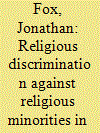|
|
|
Sort Order |
|
|
|
Items / Page
|
|
|
|
|
|
|
| Srl | Item |
| 1 |
ID:
096293


|
|
|
|
|
| Publication |
2010.
|
| Summary/Abstract |
On the surface, religious policy in China may appear contradictory. On the one hand, the state is officially atheist. It has mounted a highly publicised campaign to suppress Falun Gong, and maintains restrictions on Islam, Tibetan Buddhism and Christianity that reveal a profound fear of independent religious organisation. On the other, China insists that it respects religious freedom. The Chinese government proudly supports the staging of certain religious festivals, finances reconstruction of historic temples, and sponsors Chinese Muslims to visit Mecca. In fact, both tendencies are part of a consistent pattern of religious policy that seeks to establish firm political control over religious organisations, while visibly integrating religion into nation-building discourses. This same policy impulse applies to the treatment of both illegal and legal religions. Suppression of groups such as Falun Gong recreates the political theatre of earlier political campaigns, while support for ethnic religions and Christianity also allows the state to interpret religious ideology within a nationalist framework. In this regard, the most overt and successful ideological policy has been the state's sponsorship of Confucianism, which, unlike the other religions mentioned, has no existing organisation to overcome, and can thus be completely moulded to fit political needs.
|
|
|
|
|
|
|
|
|
|
|
|
|
|
|
|
| 2 |
ID:
126017


|
|
|
|
|
| Publication |
2013.
|
| Summary/Abstract |
This study examines religious discrimination between 1990 and 2008 against 47 religious minorities in 17 Middle Eastern Muslim majority states using data from the Religion and State-Minorities data-set. The study uses a 29-category variable which measures restrictions on the religious practices or institutions of minority religions which are not placed on the majority religion. Forty-five of the 47 minorities, including all non-Muslim minorities, experience religious discrimination. Discrimination is lowest but still substantial against Muslim minorities (e.g. Shi'i Muslims in a Sunni Muslim state), higher against Christians, but highest against Hindus, Buddhists, Druze, and Bahai. Twenty-eight of the 29 types of religious discrimination included in the data-set are present in the region. Finally, when discounting the removal of Saddam Hussein's regime from Iraq, religious discrimination in the region remains stable.
|
|
|
|
|
|
|
|
|
|
|
|
|
|
|
|
|
|
|
|
|